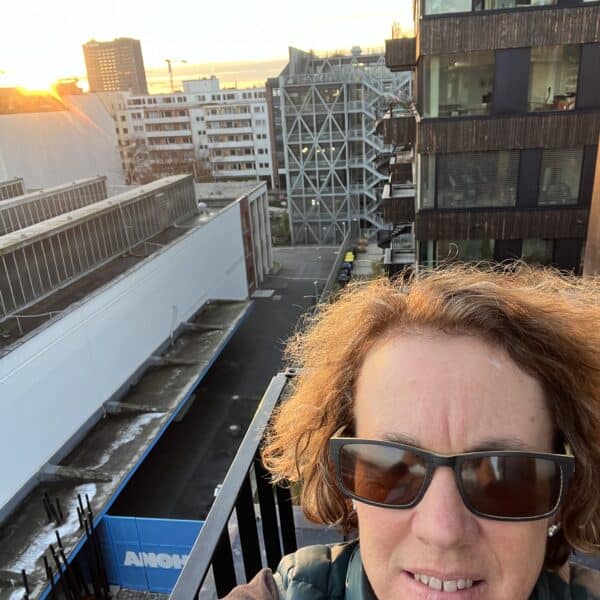by Tricia Dewey | photos courtesy of Jerry Billmeier
The Memphis gay community lost a beloved and inspiring advocate in the passing of Dee Billmeier on May 20, 2019, after a battle with lung cancer. For almost 30 years Dee was the driving force behind PFLAG (Parents and Friends of Lesbians and Gays), a group that supported those with children or friends who were gay. “Dee was someone who was very forceful in what she believed,” according to her friend Richard Sparrow, a high school teacher in West Memphis and a past president of PFLAG, “and that was gay rights and helping people. She was uncompromising in those beliefs and her work goes back decades.”
Dee became involved in PFLAG, a group that was started in 1986 by Dr. Arnold Drake, a physician who had a gay son, as support for parents with gay children. A lesbian friend of Dee’s daughter came out to Dee and her husband of 34 years, Dr. Jerry Billmeier. This friend and her girlfriend, who had not come out to their own families, came out to Dee and Jerry as a way to “try it out on someone” who they knew they could trust and who would be understanding, according to Dr. Billmeier.
“We assured them that we loved them unconditionally. It didn’t make any difference to us that they were lesbians.” Dr. Billmeier explained, “Dee got really into supporting other young people who had recently come out or were having trouble with their families or church.” Dee found her way to PFLAG by her association with Dr. Drake, who was a neighbor at the time, and then started to attend meetings. PFLAG was then the only group in Memphis that was a support group for families of gays and lesbians. Dr. Billmeier says “Dee was someone that they trusted who they could tell this secret to…. She was always very frank about what was on her mind. She let that be known. But she also gave confidence to people. They knew that she was a trusted friend and that they could talk to her about just about anything unlike some of the kids she met later who couldn’t talk to their parents, they couldn’t talk to their church.”
Dee would talk to some parents over the phone and she would ask them to come to a meeting. “Some parents would come to one meeting and she would never see them again. But a lot of them kept coming back for further advice, telling their stories over and over.” Originally, she brought the parents of her daughter’s friend but Dee continued on her own to attend meetings. Dr. Billmeier adds, ”She had a great sense of humor which put people at ease. She was a just, compassionate and sweet person.”
Richard Sparrow remembers that at the same time, Dee didn’t suffer fools gladly. “When she encountered those who were antigay or homophobic, she called them out. She didn’t let things go by. And she was always in communication with others in the community.”
Sylvia Carruth first met Dee at a PFLAG meeting in the early 1990s. “I was pretty impressed by her and we became the closest of friends over the years.” She remembers thinking, “My goodness, I wouldn’t be here if I didn’t have a gay son. She’s not only here but working and advocating for the group.” Sylvia is thankful for Dee’s tireless efforts. “I had a gay son, and I had a lot to learn [about the gay community]…. We used to have large numbers of people at our meetings and what I realized was that this was a very diverse group. There were people from other countries, from all income groups, people with gay brothers and sisters, and all walks of life.”

From about 1991 on Dee supported PFLAG in many ways. She was the secretary and treasurer of the group for most of her years of involvement. In that period of time she only missed three meetings. She was always very respectful of others regardless of race or religion or where they came from. Sylvia says that she was a wonderful spokesperson for PFLAG and was invited to speak at University of Memphis, Medtronic, Servicemaster, and other groups about diversity training and tolerance in the workplace. She kept PFLAG focused, did much of the work behind the scenes like standing in line at the Central Library to reserve their meeting room, and kept their communications connected to the national PFLAG group. Many of the gay support and advocacy groups in Memphis grew out of PFLAG work.
Richard Sparrow says that in the last few years the number of people coming to meetings declined and their mission began to change. Transgender people and their friends and parents started to need the group’s support but even those numbers had fallen off. “When Dee became seriously ill last fall the decision was made to fold the organization because Dee had been such a driving force. There were still things to do but there weren’t enough of us left. OUTMemphis has taken on some of the work. Dee was our moral center.”
Sylvia Carruth agrees and is happy to see her friend being recognized for her love and support of this group. “PFLAG wouldn’t have existed without Dee.” Dr. Billmeieir agrees. “I like to think that people like Dee and Sylvia were part of a change for the better in attitudes and social climate [in Memphis] over the years.” Her leadership, organizing, and dedication will be greatly missed.




